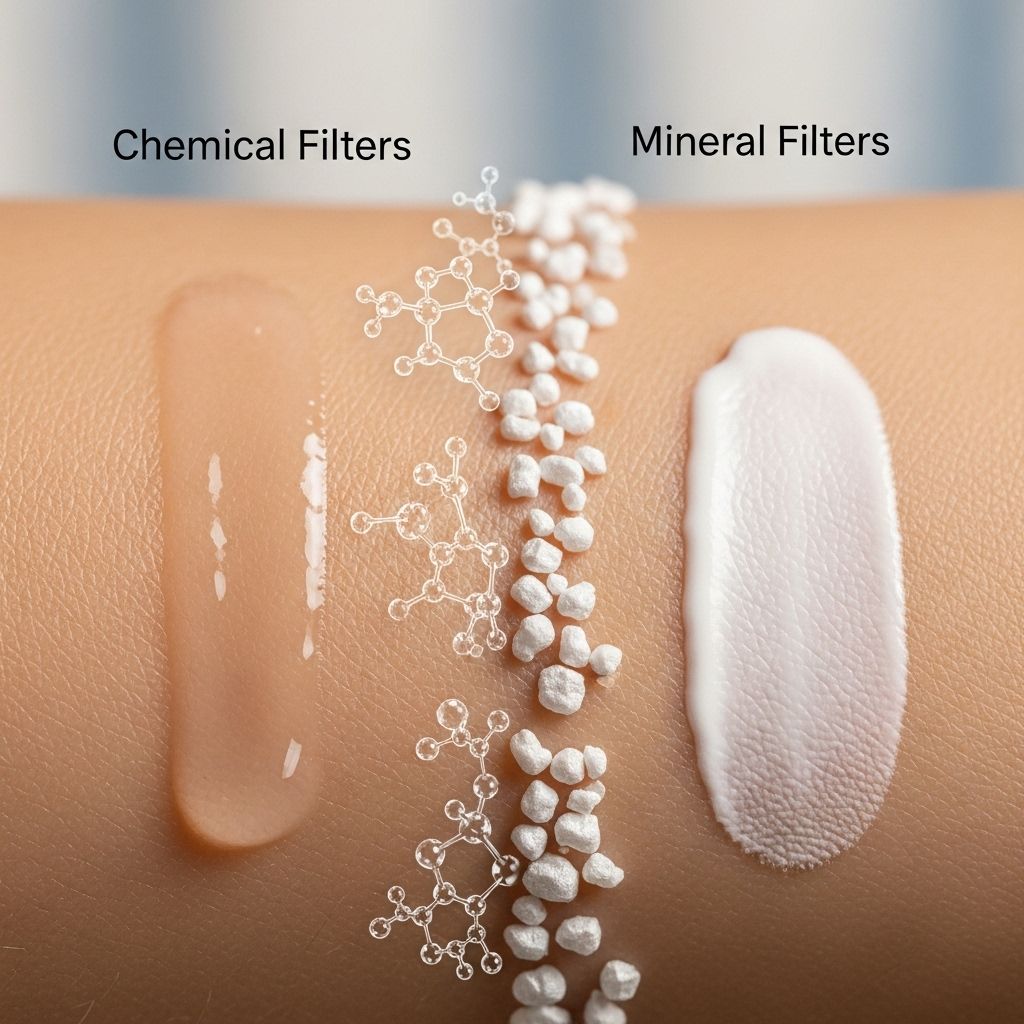Chemical vs. Mineral Sunscreen Filters Comparison
A closer look at how formula type impacts application, protection, and marine health.

When it comes to protecting your skin from harmful UV rays, choosing the right sunscreen is crucial. Two primary types of sunscreens are available: chemical and mineral. Each type has its unique characteristics, advantages, and disadvantages. In this article, we will delve into the differences between chemical and mineral sunscreens to help you make an informed decision for your skin protection needs.
Table of Contents
- Introduction
- Mineral Sunscreen
- Chemical Sunscreen
- Comparison of Mineral and Chemical Sunscreens
- Frequently Asked Questions (FAQs)
Introduction
Sunscreen is an essential component of any skincare routine, providing protection against harmful UVA and UVB rays. The choice between chemical and mineral sunscreens largely depends on your skin type and personal preferences. Understanding the differences between these two types of sunscreens can help you select the one that best suits your needs.
Mineral Sunscreen
Mineral sunscreens, also known as physical sunscreens, use natural minerals such as zinc oxide and titanium dioxide to create a physical barrier on the skin’s surface. These minerals reflect and scatter UV rays, preventing them from penetrating the skin and causing damage.
The key benefits of mineral sunscreens include:
- Gentle on Sensitive Skin: Mineral sunscreens are often recommended for sensitive skin, as they are less likely to cause irritation or allergic reactions.
- Immediate Protection: Unlike chemical sunscreens, mineral sunscreens provide immediate protection from UV rays without needing time to absorb into the skin.
- Reef-Friendly: Many mineral sunscreens are considered reef-friendly, especially those using non-nano zinc oxide.
Chemical Sunscreen
Chemical sunscreens, also referred to as organic sunscreens, use synthetic filters such as avobenzone, oxybenzone, octinoxate, and homosalate. These filters absorb UV radiation and convert it into heat, which is then released from the skin.
The benefits of chemical sunscreens include:
- Lightweight Texture: Chemical sunscreens are often lighter and more easily absorbed, making them suitable for oily skin or under makeup.
- No White Cast: Unlike older mineral sunscreens, chemical sunscreens do not leave a white residue on the skin.
- Water-Resistant Options: Many chemical sunscreens are designed to be water-resistant, making them ideal for swimming and outdoor activities.
Comparison of Mineral and Chemical Sunscreens
The following table summarizes the main differences between mineral and chemical sunscreens:
| Feature | Mineral Sunscreen | Chemical Sunscreen |
|---|---|---|
| How it works | Sits on the skin and reflects UV rays | Absorbs UV rays and converts them into heat |
| Active ingredients | Zinc oxide, titanium dioxide | Avobenzone, oxybenzone, octinoxate, homosalate |
| Suitability | Good for sensitive or acne-prone skin | Can irritate certain skin types; suitable for oily skin |
| Time to take effect | Immediate | Around 15–20 minutes |
| Environmental impact | Generally reef-friendly | Some filters are harmful to marine life |
Frequently Asked Questions (FAQs)
Q: What is the main difference between mineral and chemical sunscreens?
The main difference lies in how they protect the skin from UV rays. Mineral sunscreens form a physical barrier to reflect UV rays, while chemical sunscreens absorb UV rays and convert them into heat.
Q: Are mineral sunscreens better for sensitive skin?
Yes, mineral sunscreens are generally recommended for sensitive skin because they are less likely to cause irritation or allergic reactions.
Q: Which type of sunscreen is better under makeup?
Chemical sunscreens are often preferred for use under makeup due to their lightweight texture and ability to absorb quickly into the skin.
Q: How long does it take for chemical sunscreens to become effective?
Chemical sunscreens typically require about 15 to 20 minutes to become effective after application.
Q: Are mineral sunscreens environmentally friendly?
Many mineral sunscreens, especially those using non-nano zinc oxide, are considered environmentally friendly and reef-safe.
Q: Can chemical sunscreens cause skin irritation?
Yes, some chemical sunscreens can cause skin irritation, especially in those with sensitive skin or when reapplying throughout the day.
Ultimately, the choice between mineral and chemical sunscreens depends on your skin type, personal preferences, and specific needs. Both types can provide effective protection against UV rays when used correctly.
References
- https://www.isdin.com/us/blog/skincare/mineral-vs-chemical-sunscreen/
- https://poolbarlondon.com/mineral-vs-chemical-sunscreen/
- https://thinkhealthcare.org/difference-between-mineral-chemical-sunscreen/
- https://skinfunctional.com/2022/06/24/difference-between-organic-mineral-sunscreen-filters/
- https://www.cerave.com/skin-smarts/skin-concerns/sun-protection/mineral-vs-chemical-sunscreen
- https://health.clevelandclinic.org/mineral-vs-chemical-sunscreen
Read full bio of Sneha Tete












